Essential Guide to Albergues on the Camino de Santiago
Wondering where do you sleep on the Camino de Santiago? What the heck is an albergue anyways?
The beauty of the Camino is you can do a long-distance trek while still sleeping in a bed every night! But sleep is so important, and I know you want to know more about sleeping arrangements on the Camino.
Most pilgrims stay in albergues along the way, which are essentially hostels. I've now stayed at over 50 different albergues on three different Camino routes: the full Camino Francés, the Portugués Central route from Porto, and the Portugués Coastal route.
This guide to albergues on the Camino de Santiago will get into what it's like to stay in albergues, when to book them in advance, and tips for dealing with issues like bed bugs. And don't worry, if you don't want to stay in albergues the whole way, I get into other accommodation options too.

Albergues Overview
So what exactly is an albergue? Let's dive into the most common accommodation on the Camino de Santiago.
Where do you sleep on the Camino? What is an albergue?
Most pilgrims spend each night of the Camino in an albergue. An albergue is a hostel-like accommodation where a large group of people sleep in one room. There are typically bunk beds and shared bathrooms.
The size and set up of each albergue can vary greatly—for instance, in Pamplona, I stayed in a large church converted into an albergue that has room for a few hundred people in a few big long rooms. Whereas another time, I got lucky and had a two-person room to myself.
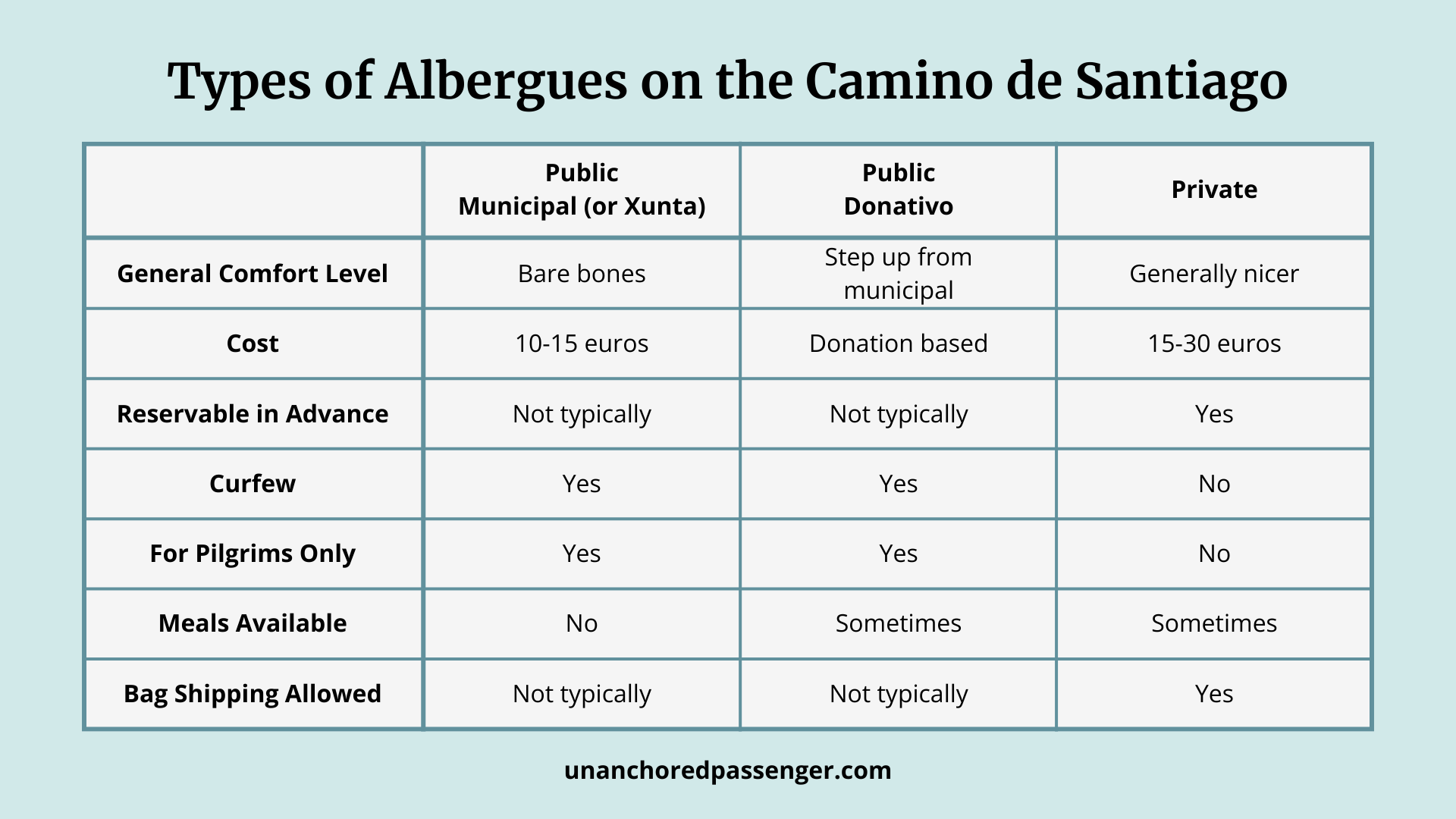
What are the different kinds of albergues?
There are both public and private albergues. Public albergues can further be classified as municipal (or xunta in Galicia) or donativo. To stay in public albergues, you have to be a pilgrim, whereas private albergues will take anyone.
Typically, you cannot reserve public albergues in advance. Private albergues, however, usually accept reservations and sometimes book up.
The municipales are usually the cheapest option and are typically run by the local city council or region. The accommodations are usually fairly bare bones and you have to bring your own sheets and towels.
The donativo albergues are typically run by religious organizations and churches. They’re usually a bit nicer than the municipales and instead of charging a set fee, they ask that you pay whatever you feel is fair that you can afford.
If you're walking the Camino for religious reasons, you may want to stay at more donativos as they often offer more religious experiences as well.
Private albergues tend to be the nicest and most expensive, typically with smaller shared dormitories. Some of them even have private rooms as well.
I usually like to stay in a mix of albergue types. I like the flexibility and affordability of municipal albergues, but I find it nice to stay in private albergues at times too.
Connect with Other Women Hiking the Camino
Join my free Facebook group! We're building up a community of women who have hiked or are planning to hike the Camino there. You can also get personalized support from me!

How much does an albergue cost for one night of sleep on the Camino?
The cost of one night at an albergue can vary depending on the type you’re staying at. Expect municipal albergues to be around 10-15 euros per night and private albergues to be anywhere from 15-30 euros a night.
As you think about how long you'll walk the Camino and your budget, keep these prices in mind.
Are albergues always open throughout the year?
Most pilgrims walk the Camino between April and October. Outside of those months, many albergues will close.
Some will remain open, but if you're walking outside of those months, you will need to check what's open before assuming you will be able to get a bed anywhere.

What to Expect in Albergues on the Camino
Even if you've stayed in a hostel before, albergues on the Camino de Santiago can be a bit different. Here's what you can expect.
Are albergues safe? What if I'm walking as a solo woman?
I hiked the Camino Francés for 33 days and the two Camino Portugués routes over 25 days. As a solo female on all three routes, I felt safe the entire time!
Spain and Portugal are generally quite safe and so are albergues. Most people staying in albergues are other pilgrims hiking the Camino as well.
The biggest risk is petty theft, so make sure to keep your valuable items close at all times. I recommend keeping your phone, wallet, and passport in a fanny pack that you always have on you. Bring it into the shower with you and shove it deep into your sleeping bag liner when you sleep.
To prevent theft, keep your valuables on you at all times in a fanny pack.
➡️ Get My Recommended Camino Fanny Pack Here
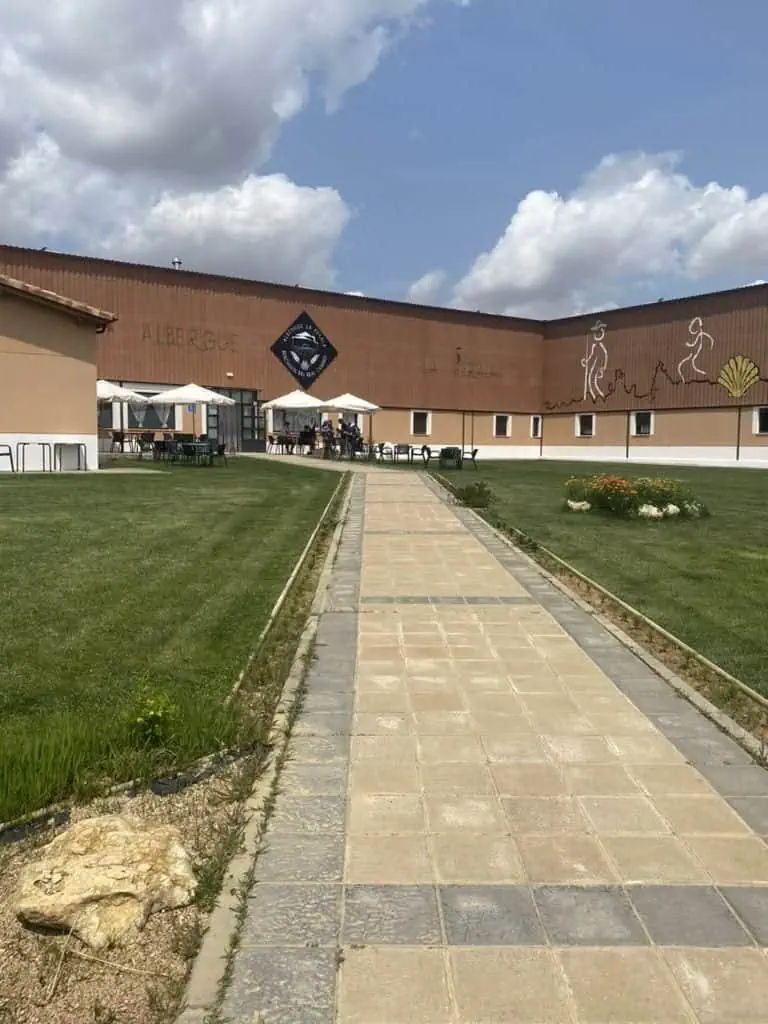
Are albergues comfortable? Can I get a good night's sleep on the Camino?
The answer to this question varies based on personal preferences. I found albergues to be generally comfortable, but I'm not too picky.
Albergue Mattresses
Historically, pilgrims used to sleep on straw mattresses or even the floor–can you imagine?? Thankfully, sleeping conditions for pilgrims on the Camino are significantly better in modern times, and you can expect to have a mattress everywhere you stay.
The mattresses, especially in the public albergues will be similar to the kind of mattresses you’d sleep on at like a kid’s summer camp in the U.S., and typically beds will be bunk beds.
I had friends who did start feeling some back pain towards the end of the hike. If you're more sensitive to sleeping on poor mattresses, it may be a good idea to upgrade your accommodation every once in a while to nicer albergues or hotels.

Noise in the Room
If you are sensitive to noise when you sleep, you should bring some earplugs. You are bound to encounter some snorers along the Camino when you're staying in rooms with a number of other people.
Even aside from snoring, when sharing a room with so many others, you're bound to hear other noises too, like people getting ready for bed or packing up early in the morning.
These highly-rated earplugs have different sizes to help with a better fit and block out up to 24 dB of noise.
➡️ Get Earplugs Here
Dealing with Heat
Many albergues don’t have air conditioning either, so some nights can get quite hot, especially if you're walking in summer.
Most have good ventilation with windows that open, but fresh air only helps so much when it's hot out.
When I walked the Camino Francés in June 2023, there were many nights where I felt quite hot trying to sleep. However, when I walked the Camino Portugués routes in May 2025, I didn't feel hot at night except for one or two nights when a big heatwave came through.
Overall, I found that most of the time, you’re usually so tired from hiking that you can still fall asleep easily and get a good sleep on the Camino. Among my 50+ stays in albergues on the Camino, I've only had trouble sleeping a few nights.
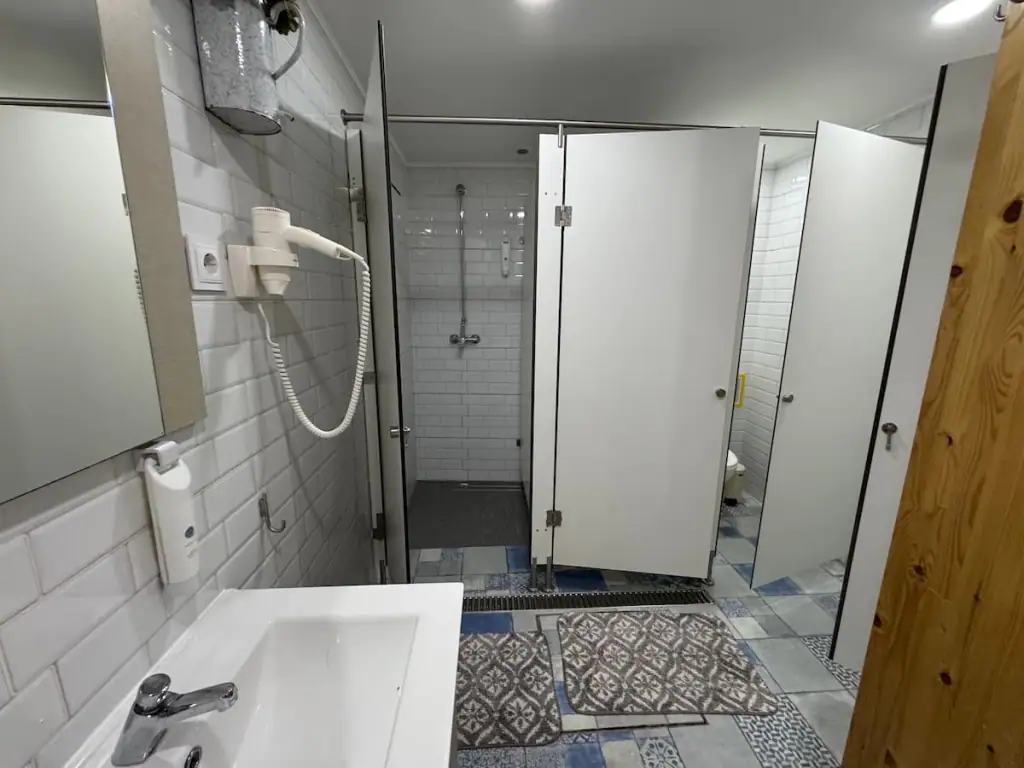
What are bathrooms like in albergues?
Bathrooms will vary by albergue. Many have large bathrooms with a number of different stalls for toilets and showering. Sometimes bathrooms are separated by gender but sometimes everyone uses one bathroom.
Occasionally, albergues will have single room bathrooms that are more private, but these aren't as common.
Even rarer, I heard about a few municipal albergues on the Camino Portugués that had group shower rooms (separated by gender). These were big rooms with multiple shower heads but without stalls for privacy. I wasn't comfortable with this personally so avoided these albergues.
Do the albergue staff know English?
In my experience along the Francés route, albergue staff don’t always know English. It’s good to learn a few Spanish phrases and have Spanish downloaded on the Google Translate app on your phone.
On the Portugués routes, I found that more staff, at least on the Portuguese side knew English. I didn't have any issues with language barriers when checking in.

Are there any rules I need to know about?
The main rules in albergues are to:
- Don't let your pack touch the bed (this is to prevent bedbug spread—more on that below).
- Place your walking shoes in the designated area.
- Respect quiet hours so everyone can sleep.
- Use a disposable fitted sheet when provided and removing it from the bed the next morning.
- Get back to the albergue in time for curfew—some albergues will lock you out if you aren’t back in time so take this seriously!
What about unspoken rules?
Of course there are also some unspoken rules to keep in mind that will help you be a courteous albergue companion to your fellow pilgrims. You'll want to:
- Use shower shoes—don't go barefoot or wear your dirty town shoes in the shower.
- Keep the window open or fans/AC on. You don't want to be that person who makes it hotter in the room and makes everyone else miserable.
- Try to shower quickly as many other pilgrims will likely be waiting to shower too.
- Have some kind of silent alarm—don't use your loud phone alarm. I always use a watch for this instead.
- Be as quiet as you can while others are sleeping. If you're leaving early in the morning, take your things out to a common area to pack up.
Ultimately, staying in albergues means you need to be as respectful of those around you as possible. This also means accepting that you might experience some inconveniences like having to wait for a shower or having to deal with people snoring.
If you can't deal with that, don't take that out on your fellow pilgrims. You'll have to get a private room instead.
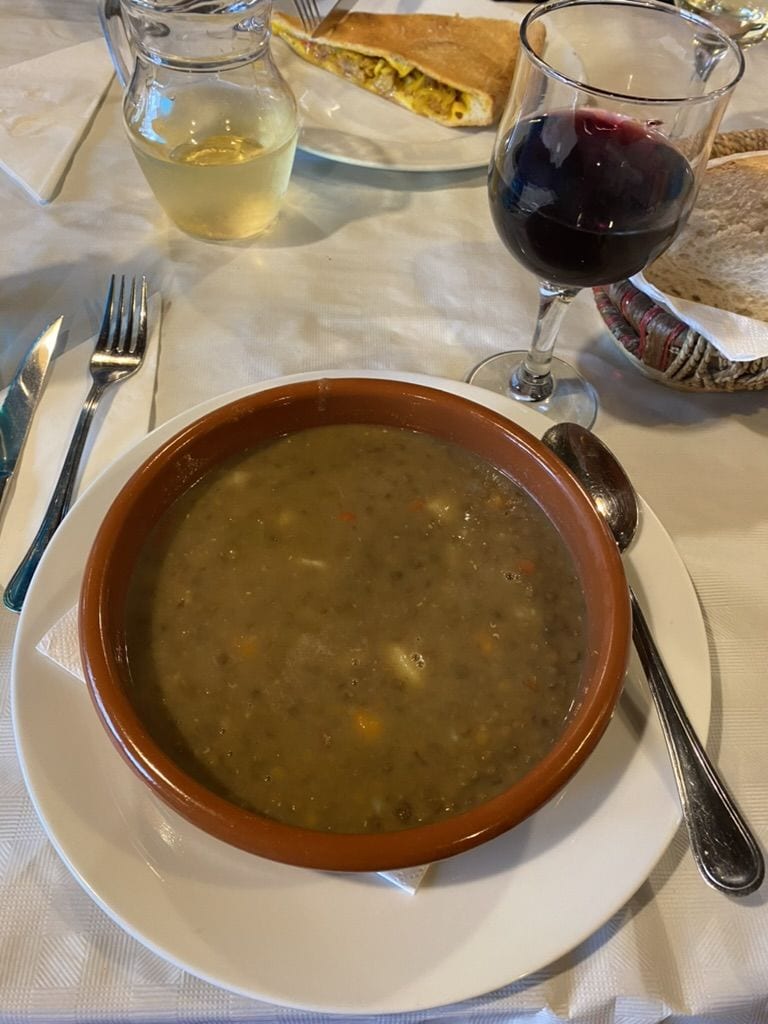
Do albergues serve dinner?
Some albergues, typically private ones, will serve a pilgrim’s meal for dinner. This typically includes three courses with an appetizer, main dish, and dessert along with red wine. I found this more common on the Francés than the Portugués.
Not every albergue serves food, but this can be particularly common in smaller towns along the Camino as albergues may be the only place to eat in some towns.
Some of my favorite meals on my hikes were at albergues, so they're definitely worth trying if you have the opportunity.

Do albergues have kitchens?
Almost all albergues have kitchens, but the facilities will vary. Some may only have a microwave, fridge, and coffee maker whereas others will have full kitchens with ovens, stoves, and plenty of cooking gear.
Most pilgrims don't cook much, if at all, on the way, but if you plan to do so, I recommend doing a bit more research into an albergue to scope out its kitchen before you decide to book.
Will there be somewhere to charge my electronics?
There will be power outlets where you can charge any electronic devices, but they may be limited. Many private albergues will have one outlet per bed, but public albergues usually have fewer outlets.
If you're worried about leaving your things out to charge, you may want to bring a power bank. It can add quite a bit of extra weight though, so I'd only bring one if you're particularly concerned about this.
I went without a power bank on my first Camino and felt fine. I usually charged devices during the day and would sometimes sit near them while they charged. I brought a power bank on my last two Caminos but only because I was recording lots of videos for you all.
This is the power bank I brought on my Caminos. It's quite heavy, which isn't ideal, but it can charge devices multiple times.
➡️ Get My Power Bank Here

What do albergues typically provide for sleep on the Camino?
Most albergues will provide a disposable fitted sheet and a pillow with a pillowcase. I’ve read that in colder months, some provide blankets as well, but don't count on it.
Many albergues do not provide real sheets or towels, so you will need to bring your own. I recommend bringing a sleeping bag liner as your blanket. If you hike in spring or late summer, you may want a sleeping bag.
Check out my Camino packing tips and list post for more info.
You'll need to bring a sleeping bag liner to use for your sheets on the Camino (unless you're hiking in colder months and need a sleeping bag).
➡️ Get My Recommended Sleeping Bag Liner Here

Doing Laundry in Albergues
Since you'll likely be carrying everything on your back, you will pack very few clothing items and likely need to do laundry every day. Here's how laundry works in albergues.
How do I do laundry in an albergue?
All albergues will have a sink area where you can wash your clothes by hand and then an area where you can hang them up, typically outside, to dry. Some albergues will also have washing machines you can use for a small fee, or they will do laundry for you.
I personally typically hand washed my clothes with this process but occasionally would get my clothes laundered for me, combining them with my friends’ items and splitting the cost, typically around 8 euros.
Since hang drying your clothes can take time, I recommend orienting your daily Camino schedule around showering and doing laundry as soon as you've arrived at your albergue.

Albergues and Bed Bugs
Bed bugs are a concern for many pilgrims walking the Camino. While you can find bed bugs anywhere in the world, they can be more common sometimes in situations like the Camino where many people are passing from place to place in a short amount of time.
Are bed bugs common in albergues?
I wouldn’t say bed bugs are everywhere on the Camino, but like traveling anywhere, they aren’t completely uncommon. Unfortunately, you may encounter them in your sleep on the Camino.
I personally did not encounter any bed bugs during my 33-day hike along the Francés route, but we heard stories of others finding them. One of my friends had some bad bug bites one day that we were thinking may have been bed bugs, but that's as close as I got to an encounter.
When I hiked the Camino Portugués Central route, I had a friend who thought she might have encountered them. We never saw them anywhere, but she found some mysterious bites on the backs of her legs.

How can I avoid bed bugs when I sleep on the Camino?
Before you leave for your Camino, you may want to spray your sleeping bag liner and pack with permethrin. Make sure to spray this outside and let it dry completely before you start packing.
Permethrin won’t necessarily prevent bed bugs from biting if you encounter them. However, it will kill them, making it less likely for you to spread bed bugs onto your next albergue.
To avoid bed bugs, make sure to never have your backpack touching the bed.
When you arrive at your albergue, check your mattress, pillow, and the surrounding area for signs of bed bugs. According to the U.S. Environmental Protection Agency, signs of bed bugs can include:
- Rusty or reddish stains from bed bugs being crushed
- Small dark spots that are bed bug excrement
- Tiny eggs and eggshells and pale yellow skins that they shed as they grow
- Live bed bugs
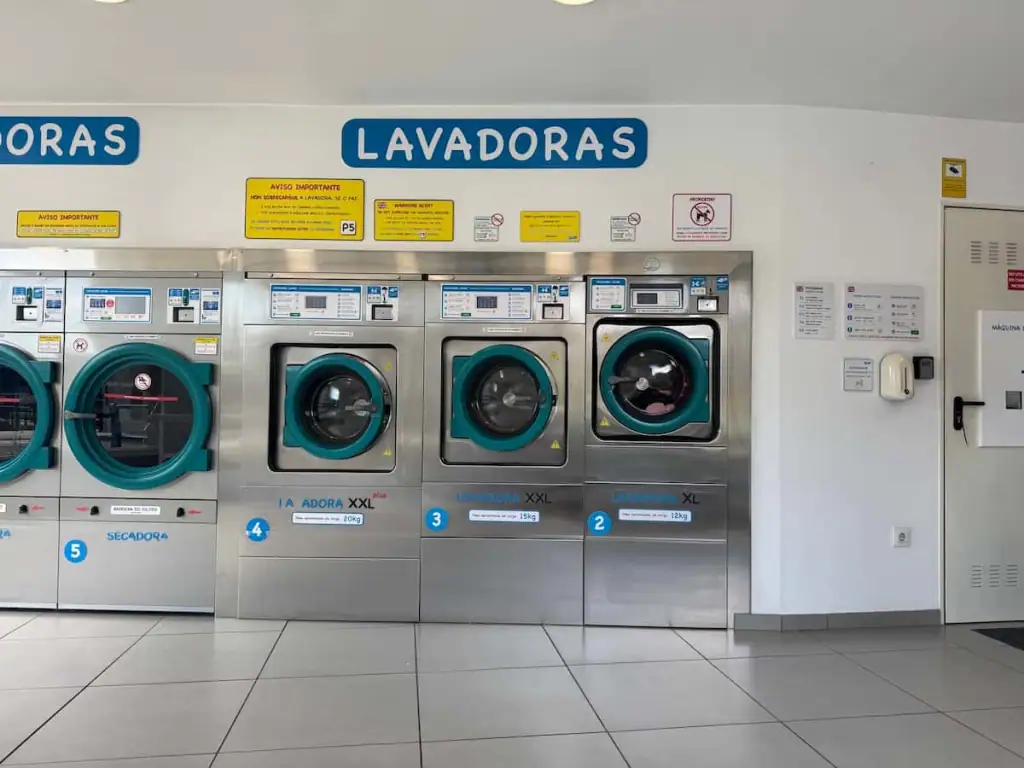
What do I do if I encounter bed bugs?
If you find signs of bed bugs before you settle into the bed, notify the albergue immediately and see if you can move to a different bed or consider going to a different albergue.
If you don't notice until you find bites later and think you know where you got them, see if you can get in touch with that albergue to let them know.
Keep in mind, however, that bed bug bites can sometimes take up to 14 days to show up. If you don't see the bites until later and saw no other signs of bed bugs on your way, then don't assume you got bitten immediately the night before.
To kill any potential bed bugs that have hitched a ride with you, your best option is to put your things in a dryer on high heat (at least 122°F / 50°C) for a minimum of 30 minutes.
This could destroy some of your gear though, so for anything you can't put in the dryer, I recommend sealing in a couple of large black trash bags and setting out in the sun for a few hours. As long as it’s hot enough outside, any bed bugs in your things should die.

Planning and Booking Albergues
Planning and booking albergues is perhaps one of the most stressful parts of the Camino for many people. Here are my thoughts to help you feel more confident with this.
How do I decide which albergue to stay at?
It’s up to you on where to stay! Before you go, I recommend prepping by downloading the Wise Pilgrim app and/or the Buen Camino app.
Both apps provide a listing of the albergues in each town, hours, amenities, and a general cost estimate. Take your time to familiarize yourself with your app of choice and the options that will be available to you.
I often opted to stay in the municipal albergues since they were more affordable and had more space for walk ins. As I made friends, sometimes I would stay in private albergues if I heard they were staying somewhere cool and I wanted to be in the same place.
Get My Albergue Recommendations
I've written about my absolute favorite albergues from my Camino Francés hike and my hikes on both Portugués routes.
I also have more detailed articles on walking stages for both the Portugués Central route and Coastal route, which include recommendations on places to stay along the way.

Does every town have at least one albergue for pilgrims to find sleep on the Camino?
Most towns will have at least one albergue to stay in but not all. Even if you aren’t planning to book your albergue in advance, it’s a good idea to check a Camino app or guidebook to ensure there are albergues in the town.
For instance, when I walked the Camino Portugués Central route in 2025, I adjusted my itinerary several times because some of the suggested stops I had read about before my walk didn't have any albergues or had very few.
When can I check in and when do I have to check out?
Check in and check out times vary by albergue but are typically as follows:
- Check in time: Around noon to 3 p.m.
- Check out time: Around 8 a.m. but most pilgrims leave before then
To find these times, check your Camino app or the website for the albergue if there is one.

Should I prebook albergues?
You can typically only prebook private albergues. I don’t recommend booking your entire Camino ahead of time–it would be a mistake to do so, especially if you get hurt or want to change plans based on friends you make.
However, it can be a good idea to book ahead of time for a few scenarios:
- For accommodation wherever you plan to start and the first day of your Camino
- If you think you'll arrive much later in the day
- If you prefer to stay in private albergues or hotels (on the Francés, I was able to stay in private albergues without a reservation, but this seemed much more difficult on the Portugués)
- If you are planning to hike a very long distance one day and want to ensure you are able to get a bed
- If you’ve found a special albergue you want to specifically stay at (e.g., Casa da Fernanda on the Portugués Central route, one with a pool, etc.)
- For the last 100 km onwards, where each route tends to get much busier
- If you’re planning to send your bag ahead instead of carrying it on your back (some municipal albergues won't accept bag transfers)
- If you see a stop has very limited beds (e.g., Orisson or Borda on the Francés)
I recorded a video on this, so definitely check that out if you want more information on when to book in advance:

How far in advance should I prebook an albergue?
If you’re prebooking an albergue, you typically only need to do so a few days in advance or even as soon as the day before.
However, if you're booking small and extremely popular albergues like Orisson on the Francés or Casa da Fernanda on the Central Portugués, I recommend booking weeks or even months in advance.
I had no idea Casa da Fernanda filled up so quickly and was super disappointed I couldn't stay there. I met some women who stayed there in May and said they booked it in February.
For the last 100 km of each route, it's a good idea to book several days in advance. This is often the busiest section of all routes because it's the minimum distance needed for a Compostela certificate.
Especially on the Camino Francés, the last 100 km from Sarria onwards is typically the busiest section of all the different routes. I think I booked that section around 5 days in advance to be safe.
How do I prebook an albergue?
You can find most private albergues on Booking.com. That's the #1 website pilgrims use to prebook accommodations.
Occasionally, albergues will have their own websites you can book with, so if you have trouble finding them on Booking.com, see if they have their own website.
Most private albergues on the Camino de Santiago are on Booking.com.
➡️ Search for Albergues on Booking.com Here

If I don't prebook, how do I ensure I get a bed?
There's no way to 100% guarantee that you'll get a bed, but there are things you can do that will help. Here are my tips based on what I typically do:
- Think about staying “off stage,” which means staying in towns that aren't recommended as stops in guidebooks
- Aim to stay at a public albergue, especially one that has more beds available
- Consider messaging the albergue in advance if possible to check if beds typically fill up quickly and if any are still open
- Plan to arrive when the albergue check in begins or maybe even a little bit beforehand so you can be one of the first pilgrims there
- Know where the next town is and have a backup plan in case you need to walk a bit farther for a bed
I stayed off stage a bit on all three of my Caminos. It helped so much, especially on the last 100 km of the Francés, which I didn't find too crowded at all.
Download my free itineraries for everywhere I've stayed on my Caminos:
What if there‘s no room at the albergues when I get into town? Where do I sleep on the Camino if that happens?
This is always a bit of a risk on the Camino if you don't prebook accommodation, which is why it’s a good idea to be flexible and have a backup plan in place.
If you get to an albergue and it's full, you can ask the staff if they know of any other albergues in town with beds available. If there are none in town, you can ask them for a recommendation on where you should hike to instead.
If there are no beds in town, then you'll either have to keep walking to the next one or take a bus or taxi if you're too tired.
On the Camino Francés, I only ran into this issue in Agés. I was one of the first to arrive and seemed to have been one of the few to get a bed without booking in advance.
One of my friends had to walk almost all the way to Burgos that day. Another group of friends found a rental house a bit farther away and were able to stay there instead.
On the Portugués routes, unlike the Francés, albergue options seemed more limited, so I made even more reservations to avoid this.
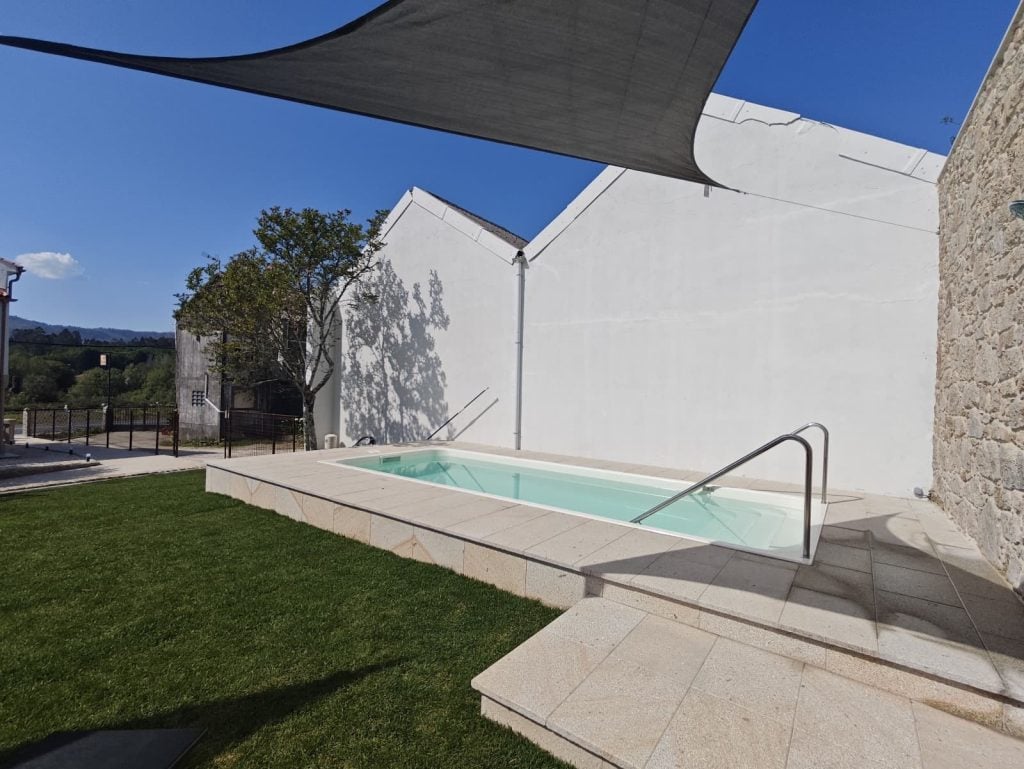
Are there any special albergues where I should sleep on the Camino?
There are a number of unique albergues on the various Camino routes.
If you’re hiking the Camino Francés, check out my post on top albergues along that route. Some of my favorites included one with singing nuns, another with a hydrotherapy spa, and some that served some of my favorite meals along that Camino.
I've written about some of the special albergues on the Portugués routes as well, so check out that article if you're walking one of those Caminos.

Other Camino de Santiago Accommodation Options
Albergues aren't the only accommodation available on the Camino de Santiago. Here's information on other kinds of places to stay.
Can I stay in hotels on the Camino de Santiago?
Aside from albergues, some cities and towns along the way will have hotels. You can also look into pensiones, which typically have private rooms and a shared bathroom.
If you're feeling bougie at all one day, I recommend spending a night of sleep on the Camino at a Parador Hotel. They’re some of the nicest hotels in Spain. They’re very historic and tend to be more affordable on the Camino than they would be elsewhere.
I stayed in the Parador in Santiago de Compostela as a treat to myself on my last night, and it was such a special way to end my adventure! If your loved one is looking to gift you something for your Camino, this is what I'd recommend.
The Parador Hotel in Santiago de Compostela is considered to be Spain's oldest and most luxurious hotel. Plus, it was originally built as a pilgrim hospital.
➡️ Get Parador Info + Book Here
Can I camp on the Camino de Santiago?
Some people camp along the way, but it’s not very common. Some albergues will allow camping on their lawn for a small fee. Generally, there aren’t many areas to camp, and it’s typically illegal to camp outside of designated camp sites in Spain.
That said, I’ve read the Camino del Norte route has more camping opportunities. While I wouldn’t count on it for your entire trip, if you’re hoping to camp more, that may be the route for you.
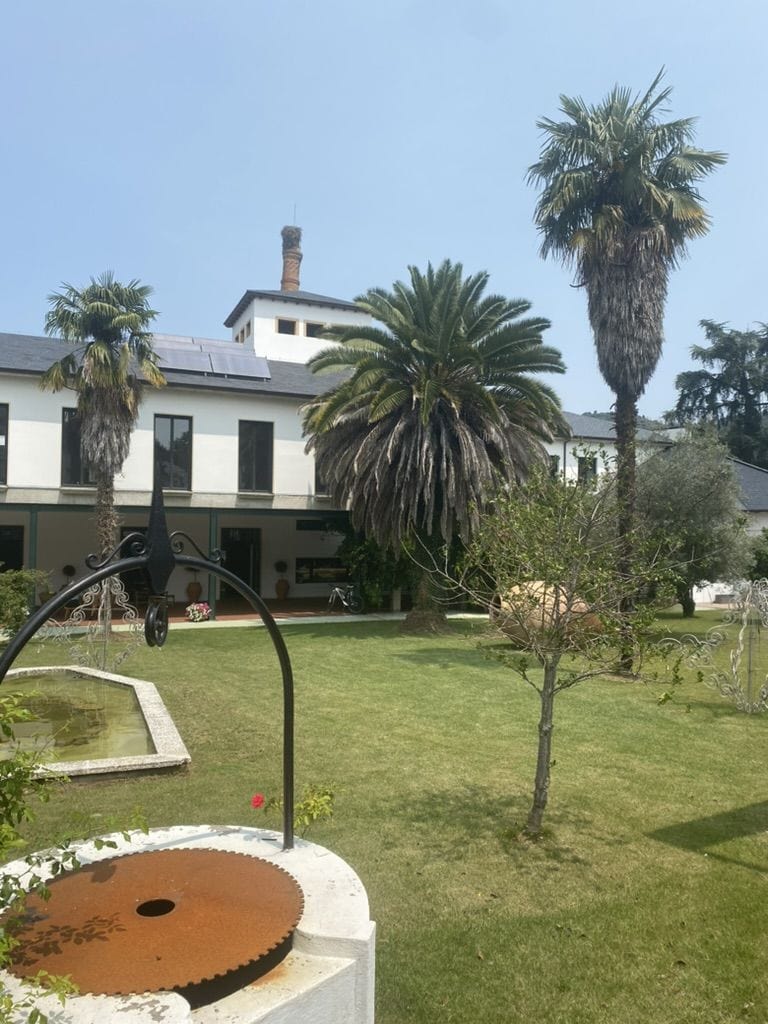
Conclusion: Albergues on the Camino de Santiago
As you can see, albergues on the Camino de Santiago can really vary depending on the kind you choose. Some are more bare bones while others are more luxurious. Some provide cooler experiences whereas others are more so just a place to rest your head.
I hope you found this article helpful in better understanding where you sleep on the Camino de Santiago and what albergues are like along the way.
Next: Start Preparing for the Camino with These Tips
Now that you know what Camino de Santiago albergues are like, keep preparing yourself for this pilgrimage with my top tips for pilgrims based on my three walks on the Camino.



